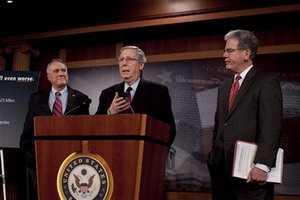Asia-Pacific
Health Care bill faces key US Senate test vote
(Agencies)
Updated: 2009-12-21 13:55
 |
Large Medium Small |
WASHINGTON: Senate Democrats confidently advanced heath care legislation Sunday toward a make-or-break test vote in a push for Christmas-week passage. Republicans vowed to resist what they appeared unable to stop.
In the run-up to the vote, the escalation in rhetoric was remarkable on both sides of an issue that has divided the two political parties for months.
"This process is not legislation. This process is corruption," said Sen. Tom Coburn, R-Okla., referring to the last-minute flurry of dealmaking that enabled Majority Leader Harry Reid, D-Nev., and the White House to lock in the 60 votes needed to approve the legislation.
|
|
Democratic Sen. Sheldon Whitehouse of Rhode Island responded in near-Biblical terms. In a speech on the Senate floor, he said Republicans are embarked on a "no-holds barred mission of propaganda, obstruction and fear. ... There will be a reckoning. There will come a day of judgment about who was telling the truth."
Whatever else it was, the legislation represented the culmination of a year's work for Democrats, pressed by President Barack Obama to remake the nation's health care system.
Under Senate rules, Democrats needed 60 votes on three separate occasions to pass the measure. The first and most critical test was set for about 1 a.m. Monday. Democrats said Nebraska Sen. Ben Nelson's announcement Saturday that he would vote for the bill gave them the support they needed.
Nelson came in for strong criticism from Republicans in Washington, who complained that he had won favorable treatment for his home state's Medicaid program. In a bit of political theater, they sought to open the bill up to extend it to all 50 states, but Democrats objected.
Nelson's agreement to an abortion-related change in the bill drew criticism from Nebraska Right to Life, a longtime supporter, and the state's Catholic bishops, who issued a statement that they were "extremely disappointed" in him.
Democrats hoped Republicans would relent in the face of a clear 60-vote majority, but if GOP critics choose to do so, they could delay a final vote on the bill until early Christmas Eve.
The House has already passed legislation, and attempts to work out a compromise are expected to begin in the days after Christmas.
The Senate legislation is predicted to extend coverage to more than 30 million Americans who lack coverage and would ban industry practices such as denial of insurance on the basis of pre-existing medical conditions. The Congressional Budget Office said it would reduce deficits by about $132 billion over a decade, and possibly much more in the 10 years that follow.
At its core, the legislation would create a new insurance exchange where consumers could shop for affordable coverage that complies with new federal guidelines. Most Americans would be required to purchase insurance, with subsidies available to help families making up to $88,000 in income afford the cost.
In a bow to Senate moderates, the measure lacks a government-run insurance option of the type that House Democrats placed in their bill. Instead, the estimated 26 million Americans purchasing coverage through new insurance exchanges would have the option of signing up for privately owned, nonprofit nationwide plans overseen by the same federal agency office that supervises the system used by federal employees and members of Congress.
The full extent of Reid's maneuvering was still unclear.
Nelson won numerous changes, including tougher restrictions on abortion coverage and an estimated $45 million in federal Medicaid funds, enough to completely cover his state's costs of complying with an expansion of the program mandated by the bill.
Vermont and Massachusetts also won additional Medicaid funds; plastic surgeons were persuasive in their bid to strip out a proposed tax on elective plastic surgery; hospitals in the Dakotas, Wyoming and Montana won additional Medicare funds; and there was more money for hospitals in Hawaii to treat the uninsured.
While Nelson's vote was the decisive one to fall into place for the Democrats, only an unpredictable series of events has left them with the ability to gain 60 without any help from Republicans.
They began the year with a caucus of 58, including 56 Democrats and two independents. Pennsylvania Sen. Arlen Specter added to their ranks in April when he suddenly bolted from the Republican party, and Sen. Al Franken made it 60 when he was sworn into office in July after a long Minnesota recount.
It was only a few weeks before Massachusetts Sen. Edward M. Kennedy, a longtime advocate of universal health care, succumbed after a long battle with brain cancer and Democrats reverted to 59 seats.
With a heavy push from Reid and the White House, and a request Kennedy wrote not long before his death, Democrats in the Massachusetts Legislature quickly changed state law so Gov. Deval Patrick could appoint a temporary replacement.
Paul Kirk, a longtime Kennedy associate and former chairman of the Democratic National Committee, was sworn in Sept. 25. "We're prepared to go to work," he said.











